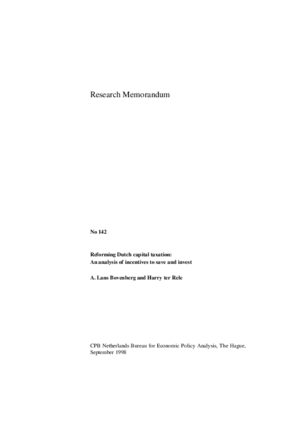September 1, 1998
Reforming Dutch capital taxation: an analysis of incentives to save and invest
One of the main elements of the tax reform proposed by the Dutch government is replacing the comprehensive personal income tax on interest income and dividends and the wealth tax by a schedular tax on a presumptive return.
This tax does not discriminate between the various types of incomes from capital at the personal level. This paper analyzes how these reform proposals affect the incentives to save and invest, employing the methodology developed by King and Fullerton. The reform eliminates tax arbitrage based on generating capital gains, which are tax exempt under personal income taxation. Moreover, the tax disadvantage of equity at the corporate level is no longer compensated by the tax advantage of untaxed capital gains at the personal level. Hence, corporations face stronger tax incentives to finance with debt. Debt finance becomes more attractive also for individuals investing in an unincorporated business and owner-occupied dwellings.
Downloads
English, Pdf, 135.9 KB
Authors
Lans Bovenberg
Harry ter Rele
